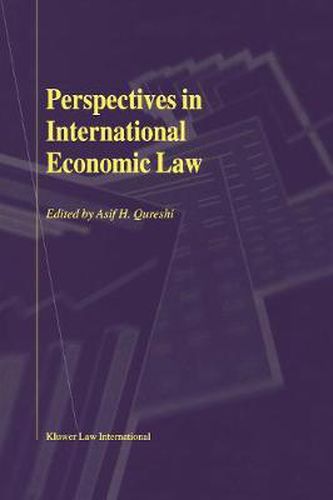Readings Newsletter
Become a Readings Member to make your shopping experience even easier.
Sign in or sign up for free!
You’re not far away from qualifying for FREE standard shipping within Australia
You’ve qualified for FREE standard shipping within Australia
The cart is loading…






This title is printed to order. This book may have been self-published. If so, we cannot guarantee the quality of the content. In the main most books will have gone through the editing process however some may not. We therefore suggest that you be aware of this before ordering this book. If in doubt check either the author or publisher’s details as we are unable to accept any returns unless they are faulty. Please contact us if you have any questions.
Economic activity, Professor Qureshi insists, is a visible manifestation of the human condition. Therefore, the laws that regulate it and develop its norms must be deeply human. International economic law must be ever-vigilant in its efforts to represent the economic needs of all strata of humanity - it must not allow the cultural imperatives of any one group to predominate. To investigate the validity of this deeply-held conviction, in May 2001 Professor Qureshi and the University of Manchester School of Law brought together a conference of major IEL scholars to elicit as broad a diversity of perspectives as possible. This book, grew out of that conference, with contributors and other scholars focusing and augmenting their standpoints in essays that crystallize the critical perspectives from which IEL may be viewed. Issues and topics that arise in the course of the investigation include the following: globalization and its institutions; the survival of the nation-state; the role of the International Court of Justice; sustainable development; developing countries and dispute settlement; developing countries and trade negotiations; regional integration; human rights and the untouchability of IEL; and the gender bias of basic IEL institutions and rules. There are also clear presentations of specifically Marxist and Islamic perspectives, and an analysis along lines of fairness as developed by Thomas Franck and John Rawls.
$9.00 standard shipping within Australia
FREE standard shipping within Australia for orders over $100.00
Express & International shipping calculated at checkout
This title is printed to order. This book may have been self-published. If so, we cannot guarantee the quality of the content. In the main most books will have gone through the editing process however some may not. We therefore suggest that you be aware of this before ordering this book. If in doubt check either the author or publisher’s details as we are unable to accept any returns unless they are faulty. Please contact us if you have any questions.
Economic activity, Professor Qureshi insists, is a visible manifestation of the human condition. Therefore, the laws that regulate it and develop its norms must be deeply human. International economic law must be ever-vigilant in its efforts to represent the economic needs of all strata of humanity - it must not allow the cultural imperatives of any one group to predominate. To investigate the validity of this deeply-held conviction, in May 2001 Professor Qureshi and the University of Manchester School of Law brought together a conference of major IEL scholars to elicit as broad a diversity of perspectives as possible. This book, grew out of that conference, with contributors and other scholars focusing and augmenting their standpoints in essays that crystallize the critical perspectives from which IEL may be viewed. Issues and topics that arise in the course of the investigation include the following: globalization and its institutions; the survival of the nation-state; the role of the International Court of Justice; sustainable development; developing countries and dispute settlement; developing countries and trade negotiations; regional integration; human rights and the untouchability of IEL; and the gender bias of basic IEL institutions and rules. There are also clear presentations of specifically Marxist and Islamic perspectives, and an analysis along lines of fairness as developed by Thomas Franck and John Rawls.